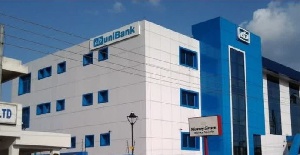 According to the report, the indigenous bank had a negative positioning from March 20, 2018
According to the report, the indigenous bank had a negative positioning from March 20, 2018
A report by KPMG, the Receiver of defunct bank, uniBank, has revealed that there was no way the bank was going to recover from the challenges it was facing.
According to the report, the indigenous bank had a negative positioning from March 20, 2018 and hard worsened till August 1, 2018.
Its total assets after Balance Post Adjustment as at March 20, 2018 was GH¢2.5 billion compared with net liabilities of GH¢9.1 billion in March 20, 2018. This left a negative net positioning of GH¢6.5 billion.
Before the liquidation of the bank by Bank of Ghana, uniBank’s unadjusted total assets was GH¢8.8 billion at the end of March 20, 2018 as against total liabilities of GH¢8.9 billion. The assets included cash and cash equivalent and government securities whilst the liabilities included customer deposits and borrowings.
In August 1, 2018, the net positioning had risen to negative GH¢7.2 billion after due to other banks and financial institutions increased from GH¢3.8 billion to GH¢4.9 billion.
This had impacted negatively on shareholders’ funds to GH¢6.5 billion at the end of March 20, 2018 which has risen to GH¢7.2 billion at the beginning of August 1, 2018.
Key findings from the balance sheet revealed exclusion of customer deposits of GH¢2.3 billion from December 2017 prudential returns to Bank of Ghana and overstatement of loans and advances to customers by GH¢1.3 billion in December 2017 prudential returns. The GH¢2.3bn representing 53 percent of total deposits of GH¢4.3 billion were not disclosed in prudential returns to Bank of Ghana
There were also significantly impaired loans and advances book and inadequate cash flows to meet short to medium term maturing obligations and balance sheet insolvent.
Related party loans and advances include GH¢243 million to uniSecurities, GH¢176 million to uniPrecision and GH¢174 million to LHS Ghana, the report added.
Quality of assets
About quality of assets, the report identified that 97 percent of top 50 loans were classified as non-performing based on BoG’s prudential guidelines while 69 percent of collaterals for top 50 loans had not been perfected.
Related party loans (gross) amounted to GH¢1.94 billion representing 42 percent of total loans. This included in other assets are amounts totaling GH¢3.7 billion that had been advanced to shareholders, related and connected parties which was considered impaired.
Advances to Shareholders, with a gross amount of GH¢3.7 billion, formed the main component of Other Assets (98% of the gross amount). Advances to Shareholders comprised mainly payments made for equity investments on behalf of related entities, special purpose loans (“SPV”) loans and other advances to related and connected entities under unusual credit arrangements
Extracts of notes
On notes contained in the 30-day inventory of assets and property report, it said the process to negotiate exit packages for employees has just commenced. Employee entitlements will be computed based on final negotiated amounts and the amounts so determined incorporated in an updated report. It, however, noted that the recoverable amounts of other assets have also not been fully assessed. “Appropriate impairment allowances and write-offs will, therefore, be computed and recognized in an updated report”, it emphasized.
The Ghana Revenue Authority and other statutory collecting entities have also been requested by the Reciever to carry out examinations to determine whether there are any obligations or exposures of the Bank that remained unpaid at the date the uniBank’s license was revoked.
The exercise to determine these obligations the report said s is yet to be completed, adding any liabilities that will be determined after the exercise is completed will be reviewed and those confirmed to be valid will be recognized in an updated report.
uniBank was among five banks that were liquidated in August 2018 and subsequently consolidated into one bank. The Bank of Ghana described the five banks as insolvent and incapacitated to continue operating as universal banks.